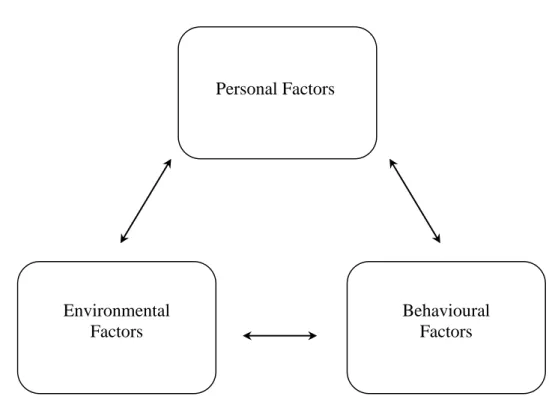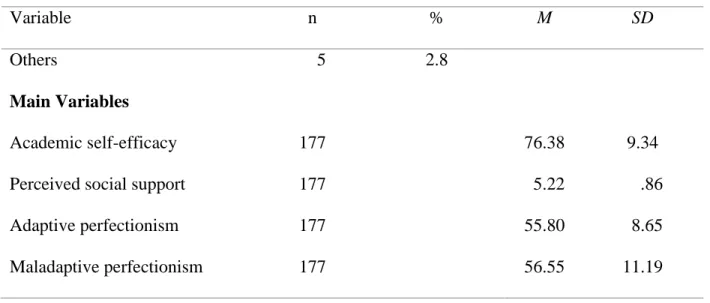Academic self-efficacy, perfectionism and perceived social support as predictors of academic procrastination among e-learning students in Malaysia. This research project is submitted in partial fulfillment of the requirements for the Bachelor of Social Science (Hons) Psychology, Faculty of Arts and Social Sciences, Universiti Tunku Abdul Rahman. This attached research paper entitled “Academic Self-Efficacy, Perfectionism and Perceived Social Support as Predictors on Academic Procrastination among E-Learning Undergraduates in Malaysia while COVID-19 Pandemic” prepared and submitted by “Chee Vane Yen, Foong Kar Whey and Tay Xiao Ying” as partial fulfillment of the Bachelor of Social Science (Hons) Psychology requirements is hereby accepted. Mrs. Grace T'ng Soo Ting).
Therefore, the current study was a cross-sectional study that aimed to investigate the predictive effect of academic self-efficacy, perceived social support, and perfectionism (adaptive and maladaptive) on academic procrastination among e-learning undergraduate students in Malaysia during the COVID-19 pandemic. The instruments implemented in the current study were Level of Academic Self-Efficacy, Multidimensional Scale of Perceived Social Support (MSPSS), Almost Perfect Scale-Revised (APS-R) and Academic Procrastination Scale–Short Form (APS-S). The findings indicated that academic self-efficacy and adaptive perfectionism negatively predict academic procrastination while perceived social support and maladaptive perfectionism positively predict academic procrastination.
Relevant parties can also make use of the knowledge and information provided to implement effective and useful strategies to prevent the occurrence of academic procrastination. Conceptualizing on Academic Self-Efficacy 18 Academic Self-Efficacy and Academic Procrastination 19 Conceptualizing on Perceived Social Support 21 Perceived Social Support and Academic Procrastination 22.
Introduction
Another study conducted determined that academic procrastination can be predicted through perceptions of academic self-efficacy (Kandemir, 2014a). In another perspective, social support is considered to have an influence on academic procrastination (Madjid et al., 2021). There is research indicating that the level of academic procrastination can be reduced by perceiving social support from family, friends and school (Madjid et al., 2021).
According to Closson et al. 2019), there is no significant relationship between procrastination and student academic procrastination. To investigate the predictive effect of academic self-efficacy, perceived social support, and perfectionism (adaptive and maladaptive) on academic procrastination among e-learning students in Malaysia during the COVID-19 pandemic. H1: Academic self-efficacy negatively predicts academic procrastination among e-learning students in Malaysia during the COVID-19 pandemic.
H2: Perceived social support negatively predicts academic procrastination among e-learning students in Malaysia during the COVID-19 pandemic. According to Suhadianto et al. 2021), academic procrastination during COVID-19 has an effect on the individual's subjective well-being.
Literature Review
Therefore, the research suggested that students with low self-efficacy are more likely to procrastinate on academic tasks. Kandemir (2014b) indicated that there is a positive and significant relationship between academic self-efficacy and academic procrastination. Perceived social support refers to the extent to which individuals have received social support from various sources, such as friends, relatives, and significant others (Zhao et al., 2021).
As mentioned above, perceived social support is when an individual receives social support from friends, family members, or significant others (Zhao et al., 2021). According to studies (Kennedy et al., 1988; Wentzel, 1999), social support can influence student procrastination when it comes to working on their final project. Erzen and Cikrikci (2018) stated that perceived social support from the family plays an important role in predicting academic procrastination.
The present study builds on the SCT theory where academic self-efficacy and perfectionism are personal factors, perceived social support is an environmental factor, and academic procrastination is the behavioral factor. According to Al-Rosyid (2018), the significant effect found in the study can be used for the prediction of perceived social support on academic procrastination.

Methodology
The findings of the current study indicated that perceived social support was a significant predictor, but it positively predicted academic procrastination. The result of the present study is in line with Swaraswati et al. 2017) who stated that academic self-efficacy negatively predicts significant academic procrastination. However, the outcome of the current study did not support the hypothesis that perceived social support negatively predicts academic procrastination among e-learning undergraduates in Malaysia during the COVID-19 pandemic.
The last hypothesis of this study was supported by the result showing that maladaptive perfectionism positively predicts academic procrastination. Based on the findings, it showed that academic self-efficacy and adaptive perfectionism negatively predict academic procrastination. Students can use these findings to increase their academic self-efficacy and avoid academic procrastination.
Study on conscientiousness, academic self-efficacy and self-esteem predictive power on academic procrastination among counseling students. The predictors of academic procrastination: Responsibility, attributional styles regarding success/failure, and academic self-efficacy beliefs. The mediating and buffering effect of academic self-efficacy on the relationship between smartphone addiction and academic procrastination.
The relationship between perfectionism and academic procrastination; The mediating role of academic self-efficacy, self-esteem, and academic self-handicapping. Academic procrastination of graduate students: The role of academic self-efficacy and the big five personality traits. The relationship of academic self-efficacy to academic procrastination in students completing their thesis.
